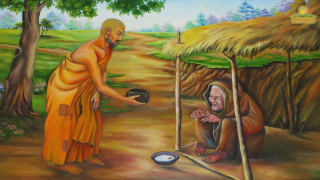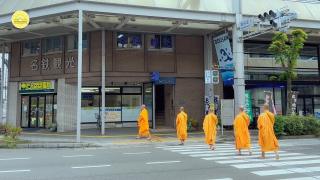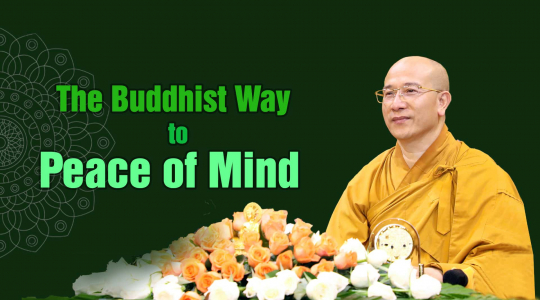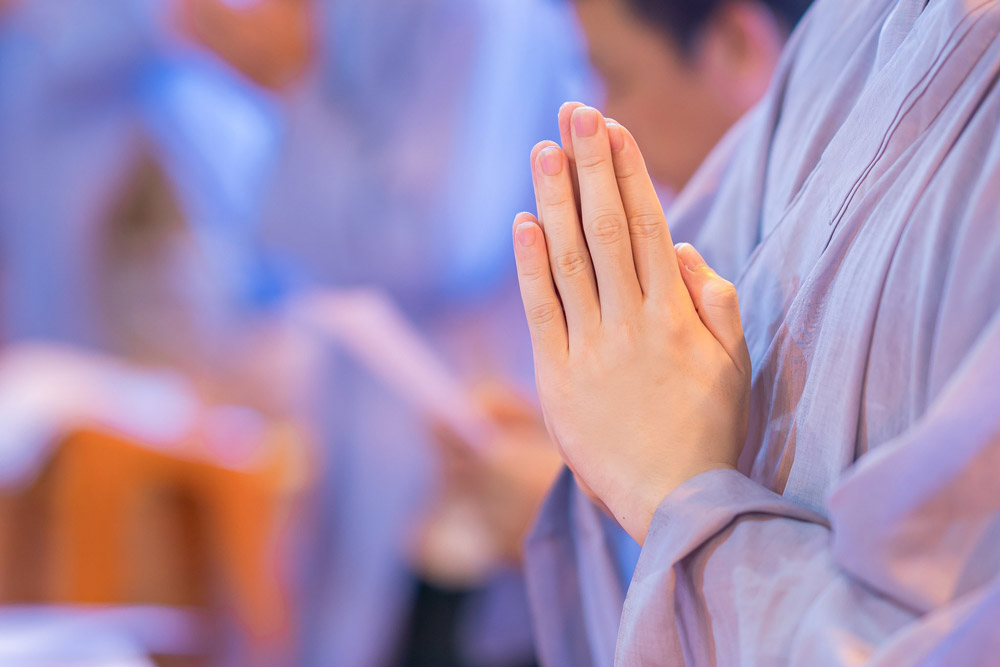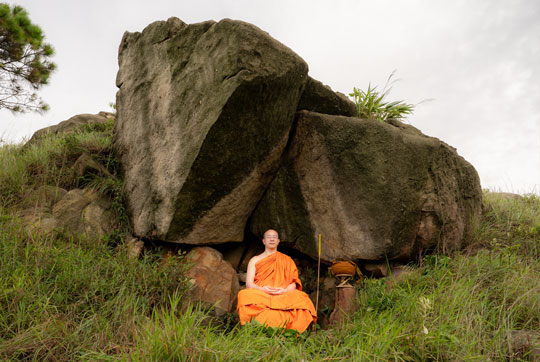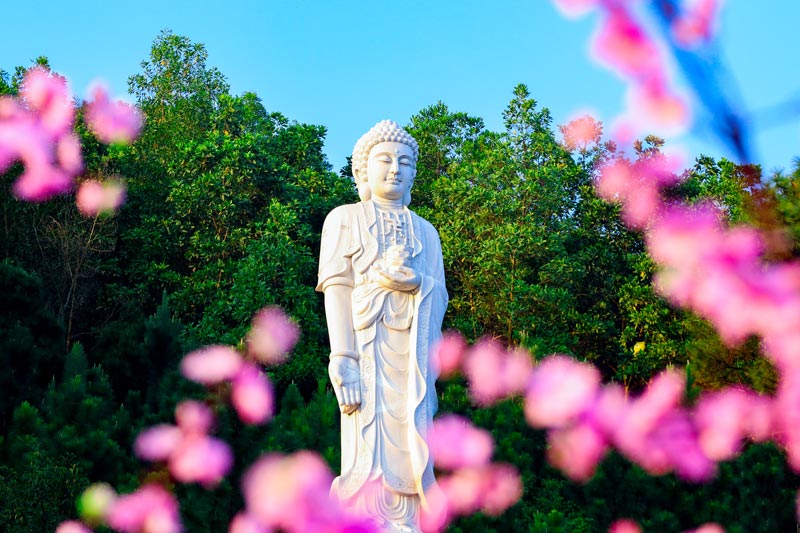03 mindsets that lead to happiness by the Buddha
Table of contents [Hide]
- 5 ideas of happiness in the secular world
- Everything changes and so does secular happiness
- The root of happiness is your mind
- Tame your mind to find true happiness
- #1 Reducing sensual desires—the necessary condition for your happiness
- #2 Know what is enough—peace of mind will come to you
- #3 Be yourself! Stop comparing yourself to anyone
Happiness is a humans' essential need. People from all walks of life pursue happiness. However, the definition and meaning of happiness have changed over time and varied among people. People may find happiness in money, fame, love, etc., but whether this perception is true or not has been controversial. What exactly is happiness? Where does happiness come from? Buddhism can explain happiness in such a thorough way that you may want to change your views on life.
5 ideas of happiness in the secular world
Thay Thich Truc Thai Minh, the abbot of Ba Vang Pagoda, said that there are five ideas of happiness that normally people have in the secular world.

First, most people want to have a happy family which consists of harmonious relationships between spouses and good kids. The second idea is being wealthy. People often want to own properties to buy anything they want, or at least they find it possible to make ends meet. Third, “health is golden”. Everyone wants to be healthy. No one wants sickness. “Even in Buddhism, health is highly appreciated,” Thay explained. “Good health enables us to do anything we want. Property is important but it will be meaningless if we don't have good health. Without health, we cannot do and feel anything, hence unhappiness.” Fourth, being successful also makes people happy. And being loved makes the last idea of happiness, which is very important in society. If we manage to have all four factors above but have no friends and no one loves and respects us, with whom can we share our happiness? Therefore, social relationships are an important ingredient of happiness.
People consider those who meet all these five factors above happy people according to the ordinary perception of the secular world. Nonetheless, have you ever doubted if money, fame, relationships and so on can guarantee you true happiness? If they can, why are there still famous and wealthy figures around the world committing suicide? Most of them have died from stress or inability to overcome difficulties of life. So these factors are not a satisfactory answer to a truly happy life.
Everything changes and so does secular happiness
In the first awakening of the Sutra on the Eight Awakenings of the Great Beings, the secular world is described: “The world is impermanent. The earth is fragile and perilous. The four great elements are of suffering and empty. In the five skandhas (aggregations) there is no self. All that arise, change, and perish.”
That is the truth. People come and go. So do money, fame and love. Nothing lasts forever. When in love, people believe that to love and be loved is happiness. However, the first happy stages of love draw to a close end when couples start to be fed up with each other after a long time together. A problem arises that we can never keep anything unchanged forever, according to the law of impermanence the Buddha taught.
Let's look back on the 5 ideas of happiness in the secular world. If happiness is formed and based on the materials and relationships, whereas the world changes and is unstable, this happiness is not true and stable, either. Where can we go to find stable happiness? Where does happiness come from?
The root of happiness is your mind
Since the search for happiness from the exteriors of our mind does not quite work, it is best to contemplate that “the root of happiness does not lie outside, it comes from within—our inner mind,” Thay Thich Truc Thai Minh shared. “It is our mind that feels this world and life. Our mind feels happy, sad, worried, thoughtful, scared, etc. That is our mind. So we are happy because our mind is happy, aren't we? The external factors outside our mind do not lead us to true happiness. They are just conditions and external circumstances that partially contribute to our happiness, not its basics.”
When the Buddha realised that the mind is the root of happiness, He reflected on His mind and solved the problems of the mind. He trained His mind to be happy in all circumstances. People all said that the Buddha attained the Perfect Enlightenment under the Bodhi tree. Theoretically, this is true. But when we look deeper into the story more than 2,500 years ago, it turned out that the Buddha attained Perfect Enlightenment right within His mind. It was His mind that became perfectly pure and calm, which made Him achieve Buddhahood.
Buddhism can be called a religion that focuses on cultivating the mind. “Cultivating and training the mind to attain a state that we can be peaceful and happy in the face of any situations. That is its root. Happiness lies in the mind, not in any external factors, namely money, fame or anything else,” said Thay. Why does true happiness come from within, not the exteriors? It is because anything outside our mind changes.
At this point, there is a bigger question. “So, facing such changes outside,” Thay continued, “how do we cultivate our mind to keep it calm and concentrated? Should our mind be peaceful and serene in any case, we can have bliss—true happiness. That is the Path that the Buddha walks.”
Tame your mind to find true happiness
Happiness comes from within, and the mind is the core. As ordinary people, however, our minds seem not to be concentrated and stable in front of different situations of life. In the Dhammapada, the Buddha called humans' minds monkey minds.
“The craving of a thoughtless person grows like a creeper. That one runs from life to life, like a monkey seeking fruit in the forest.”
In another sutra, the monkey mind was also mentioned, "Just as a monkey swinging through the trees grabs one branch and lets it go only to seize another, so too, that which is called thought, mind or consciousness arises and disappears continually both day and night" (S.ii.95). In the hope that everyone shall find true happiness, Thay Thich Truc Thai Minh talked about the mindsets we should adopt to have a happy life according to the Buddha's teachings.
#1 Reducing sensual desires—the necessary condition for your happiness
“Cultivate yourself and try to reduce your five desires,” Thay Thich Truc Thai Minh advised, “you should practise step by step. All hardships in life and thus the cycle of birth and death all arise from the five desires.” Those who do not cultivate their minds will suffer a lot, no matter how rich or poor they are. The five desires that every person has are property, sexual love, fame, food and drink, and sleep. Many people would like to own more than they need. This tendency is expressed in a common saying “the greed of men is infinite”. As long as people tend to continuously find pleasure in the desires, they will end up gaining nothing because no one can bring anything they get from the five desires with them when they die.
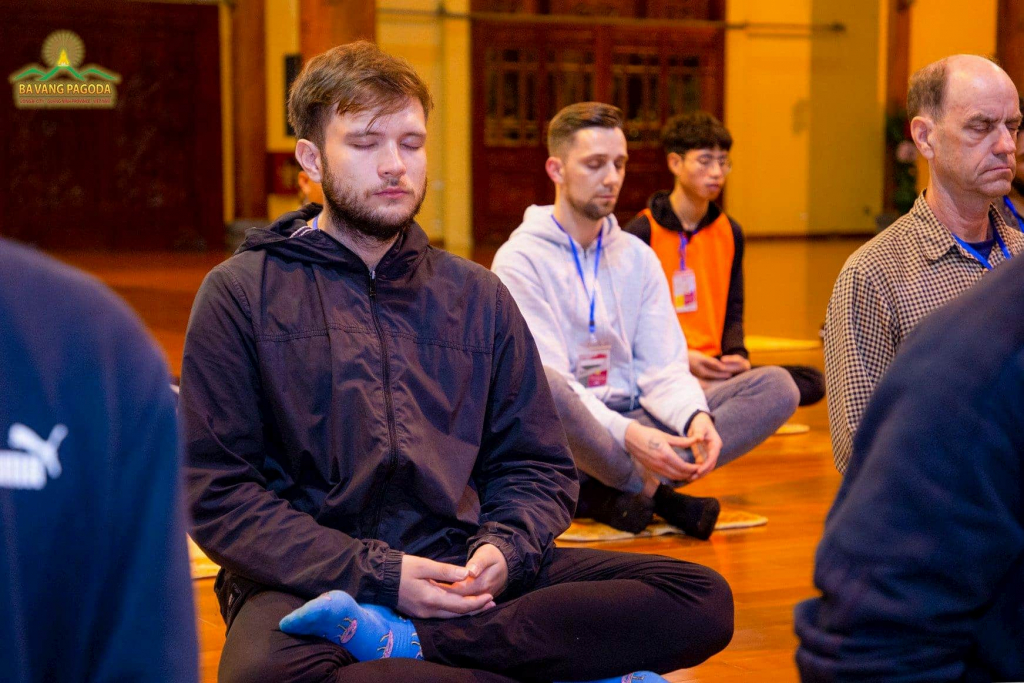
Participants of the 2-day Meditation Experience Programme sitting meditation in the Main Hall of Ba Vang Pagoda
There is no difference between the rich and the poor in finding happiness. Poor people want to be rich and rich people want to be even richer. Despite that, both the poor and the rich should reduce desires in external objects to live happily. If we keep on chasing our desires, we will never reach happiness. The more desires one has, the more he has to suffer. If we want happiness, we must reduce our desires. This mindset of cutting down on desires brings us happiness not only in this life but also in many next lives.
#2 Know what is enough—peace of mind will come to you
Once sharing about happiness, Thay Thich Truc Thai Minh said that: “When learning the Buddha Dharma, you will have the chance to learn how to reduce desires, and know what is enough, then you are happy. Even lying in a golden bed does not make you happy if you don't know what is enough. On the contrary, you still feel happy to lie in an old mat when you think that is enough for you. That is the spirit the Buddha taught. Analyse and reflect carefully on yourself, then you will have a stronger belief in the Buddha's teachings. The Buddha taught that those who know what is enough for them are happy people. Therefore, true Buddhists who know to return to the Buddha Dharma and concern self-cultivation will suffer less. Smart practitioners feel content with whatever they have. Should they not have much property, they will stay happy with what they have. In contrast, if they are wealthy, they are likely to share with unlucky people. Just keep in mind that property is just temporary, and use them for remaining healthy to cultivate yourself, not for the main goal of life.” Anything we have in life is what we deserve. Just be satisfied with what we have, we will have more happiness.
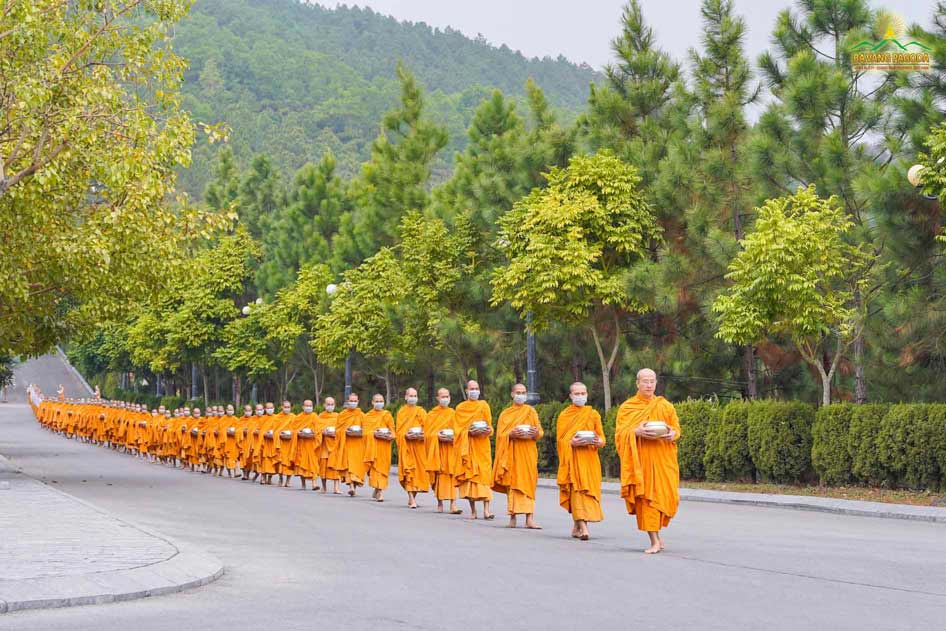
Thay Thich Truc Thai Minh and the Sangha of Ba Vang Pagoda hold their alms bowls going on an alms round
The Buddha and His ordained disciples own nothing much but three clad robes and one alms bowl each person. They eat only in the alms bowl and have one meal per day but they are always happy and peaceful. Because they know that is enough for them and think that few desires bring happiness.
#3 Be yourself! Stop comparing yourself to anyone
Once in October 2018, Thay Thich Truc Thai Minh preached a Dharma talk about happiness to the lecturers and committees of National Economics University He told a short story of a crow, swan, parrot and peacock, and delivered the message: “Never will you have happiness if you keep comparing yourself to others and envying them”. Here comes the story:

“Once upon a time, a crow was living in the forest. One day, he saw a swan and adored it. Seeing himself all in black, he came and told the swan: “Hey mate, you must be the happiest bird in the world. I wish to have white feathers like yours.”
The swan replied: “I was feeling happy until I saw a parrot, who has more colours on his feathers. He is more beautiful than me, a top-to-toe white swan, so I am not happy.”
The crow then approached the parrot. “You are so happy, I adore you,” said the crow. The parrot replied: “I used to think I was happy until I saw a peacock. I am nothing compared to him. The peacock has hundreds of colours. Everyday many people come to see him.”
The crow visited the zoo to meet the peacock. Many people gathered to watch him dance. After the people had left, the crow approached the peacock. “Hey peacock,” the crow said, “you must be the happiest bird in the world. So many people come to see you.”
The peacock replied, “I used to think that I was happy. But to be honest, I wish to be like you, dear crow. I am trapped in this cage. Although thousands of people come to see me, I wish one day I could be free so as not to be kept in this small locked cage. I wish I were like you to fly freely in the sky.”
On hearing that, the crow understood about happiness. He thought, “if I keep comparing myself to others, I will never have happiness.”
The Buddha taught that human desires are endless. “It is like the thirst of a person who drinks salt water: one gets no satisfaction and one's thirst is only increased.”
Know what is enough, then we can be happy - that is the teaching of the Buddha. The Buddha in whom no suffering dwell attained supreme happiness. We all can learn from the Buddha and walk the path He used to walk. Eventually, we will have supreme happiness. Try our best but be content with what we have, we will be peaceful in this life.
Reference:
- Sutra on the Eight Awakenings of the Great Beings translated from Chinese by Buddha Gate Monastery.
- The Sutra on the Eight Realizations of the Great Beings, translated from the Chinese with Commentary by Thich Nhat Hanh.
- The Dhammapada, translated by S. Beck.


